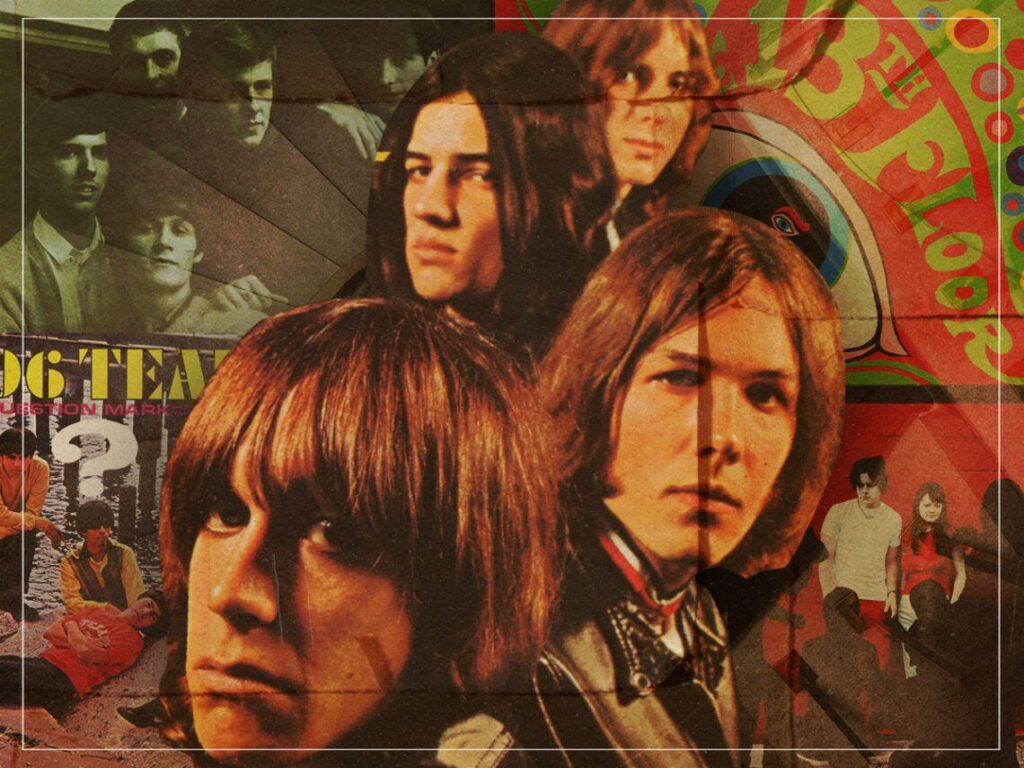Five Easy Masterpieces: an introduction to garage rock
 Posted On
Posted On
(Credits: Far Out / Album Covers)
Rock ‘n’ roll arrived in the 1950s as an amalgam of preexisting genres such as gospel, country, folk, jazz and the blues. Leading proponents like Elvis Presley and Little Richard defined the genre as a more rhythmic, propulsive and hence sexually invigorating musical format apt to inspire a revolution. In the 1960s, a countercultural revolution arrived in the West courtesy of Bob Dylan’s early folk hits and The Beatles’ transatlantic success. Concurrently, the so-called garage rock wave began.
Garage rock is a raw, energetic style of rock ‘n’ roll that originated in the US. Early proponents like The Kingsmen and The Sonics married the danceable tempos of surf-rock with an assertive, shouting vocal style not dissimilar to that of Mick Jagger in the early Rolling Stones catalogue. The crucial difference, however, was the DIY ethic and unrefined production that gave garage rock its name.
Working with low budgets, original garage rock bands tended to record using a basic one or two-track setup. In their efforts to save money, these musicians gained plenty of attention for their simple, energising music, which could be transferred easily from studio to stage. Little did the garage rockers know at the time, but their sound was the first domino to fall on the path to punk. Thanks to his seminal work with The Stooges, Iggy Pop, the ‘Godfather of Punk’, is often considered the bridge between garage and punk.
In the post-punk era, the raw distorted energy of garage rock lay nascent in the work of noise rock and grunge artists like Sonic Youth and Nirvana. While some say the garage rock revival began with such groups, The White Stripes truly embodied the revival with their prevalent work in the late 1990s and early 2000s. The Libertines, The Hives, The Strokes and The Kills also became associated with the same movement.
Below, we celebrate garage rock with five masterpiece releases from the genre. The list includes some early classics, a transitional proto-punk landmark, a psychedelic gem and a revival era essential.
Five essential garage rock albums:
5. The Sonics – Here Are the Sonics!!! (1965)
Given the genre’s general lack of definition, several bands could claim to be the first garage rock group. The Kingsmen and The Sonics were undoubtedly among the earliest, having formed in 1959 and ’60, respectively. The former made their most significant impact in 1963 with the much-covered garage rock standard, ‘Louie Louie’. The latter released their first single, ‘The Witch / Keep a Knockin’ in 1964 in the run-up to their masterful debut album, Here Are The Sonics.
Although The Kingsmen got there first with ‘Louie Louie’, Iggy Pop crowned The Sonics as the spiritual home of garage rock. Discussing the vital influence of garage rock on Guns N’ Roses in a past interview with Louder, Duff McKagan recalled: “I got to play on a record with Iggy, and I was talking about The Sonics, and he said, ‘Man, that was the first real garage rock band, and that band influenced The Stooges.’”
4. ? and the Mysterians – 96 Tears (1966)
? and the Mysterians are among the most iconic bands of the initial garage rock wave. The group formed in Michigan in 1962 and established an enthusiastic following thanks to their unique, organ-driven garage rock style. Impressively, the group reached number one on the Billboard Hot 100 with their enduring debut single, ’96 Tears’. The track sometimes has the band labelled a one-hit-wonder, but the back catalogue is well worth a browse, especially the like-titled debut album.
Rudy Martínez’s distinctive yelping vocals perfectly suited the garage rock sound and became a building block for punk and proto-punk artists, including David Bowie. In 1979, the Starman appeared as a guest DJ on BBC Radio 1 and played the band’s biggest hit. “? and the Mysterians’ ’96 Tears’, which nobody has in their record collection,” Bowie said, introducing the song. “They actually got it here [to the UK]. It’s an extraordinary piece of music.
3. 13th Floor Elevators – The Psychedelic Sounds of the 13th Floor Elevators (1966)
The garage rock sound initially took off as a low-budget reaction to surf-rock phenomena like The Beach Boys and British Invasion bands like The Beatles and The Rolling Stones. When these major rock bands embraced psychedelia in 1966, so too did the garage rock innovators. No garage rock band captured the essence of early psych-rock than The 13th Floor Elevators and their colourful debut album, The Psychedelic Sounds of the 13th Floor Elevators.
This record is among the most influential of the mid-60s garage rock wave thanks to its embrace of contemporary rhythm and blues styles, progressive psychedelia and folk. Despite being only 34 minutes in length, the album is a diverse smorgasbord of attractively unrefined psych-rock. The lead single, ‘You’re Gonna Miss Me’, remains the band’s most definitive anthem and a true garage classic.
2. The Stooges – The Stooges (1970)
If Iggy Pop’s drug-addled renditions of ‘Louie Louie’ weren’t enough of a giveaway, The Stooges were humongous fans of the mid-1960s garage rock wave. With their seminal 1969 debut album, the band caught the tail end of the first movement and picked up proto-punk merits in the same scoop thanks to a macabre, salacious slant. The Stooges’ first three albums are difficult to fault, and each has its merits, but as the most rudimentary garage-adjacent product, I unearth the debut album today.
John Cale, who had not long departed The Velvet Underground, worked with The Stooges to produce this hell-raising debut. Most famously, side one hears Iggy’s beautifully sordid attempt at a lovesong, ‘I Wanna Be Your Dog’. Elsewhere are highlights like ‘No Fun’, ‘1969’ and the ten-minute epic, ‘We Will Fall’. By some musicologists’ criteria, this record collection essential is ground zero for punk.
1. The White Stripes – White Blood Cells (2001)
In this list, I wanted to explore albums from the first garage rock wave primarily, given that such releases were the foundation from which punk and other simple rock styles grew. However, it would be folly not to tip our hat to the Detroit garage rock revival group, The White Stripes, for our final entry. Alongside his first wife, drummer Meg White, Jack recaptured garage rock’s essence with simple, punchy riffs and lyrical vignettes.
The White Stripes are best known for the 2003 single ‘Seven Nation Army’, which has become a universal sports event anthem over the past couple of decades. However, at this point, the duo had already released their most consummate masterpiece, 2001’s White Blood Cells. From the riotous ‘Fell In Love With a Girl’ to the acoustic ditty ‘We’re Going to Be Friends’, this album is well-balanced and a fine example of modern garage rock.
Related Topics


